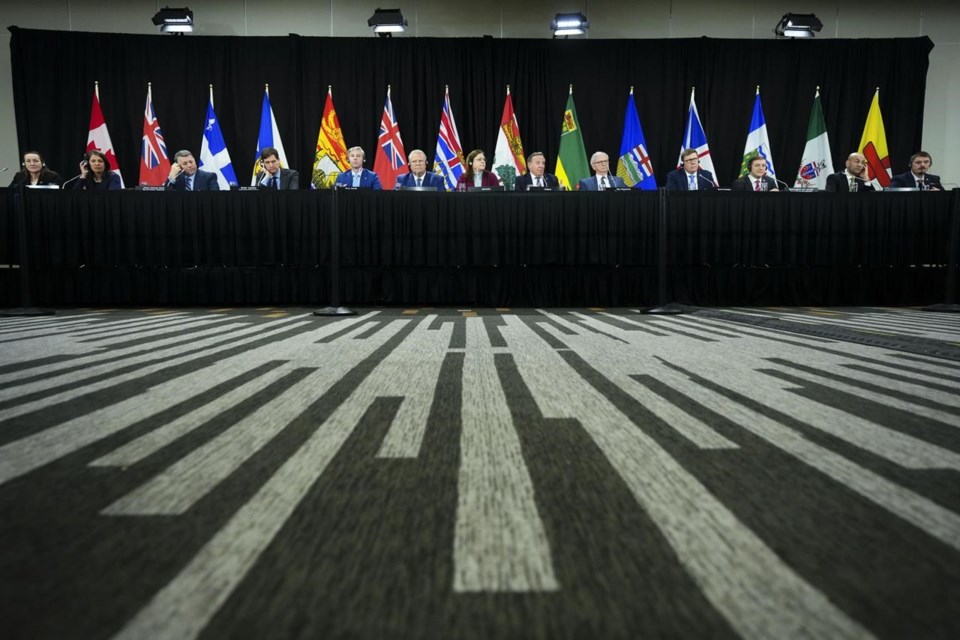OTTAWA — Provincial leaders were frantic about the ailing state of their health care systems last year when Prime Minister Justin Trudeau sat them down and offered $46.2-billion worth of urgent treatment.
It wasn't enough, but most of the provinces grudgingly accepted the broad terms of the deal and returned home to negotiate the finer points behind closed doors.
Since then, Ottawa and the provinces have continued to broker a collective long-term vision for health-care improvements. But doctors, nurses and other health advocates say the crisis is only getting worse.
Health workers want to see governments move faster to treat the crisis. But a real fix will take time, Health Minister Mark Holland acknowledged in an interview.
"We're not looking for placebo policy here," Holland said.
That's why the federal government has pushed for specific promises from provinces about how they will spend the money, "which is why it takes time to then negotiate these deals," he added.
The scenes that have played out over the last 12 months have been jarring: people turned away from emergency rooms, seniors languishing for days in hospital hallways, family doctors abandoning their practices, burned-out nurses leaving the profession they once loved.
The state of saąúĽĘ´«Ă˝'s health systems has already cost people their lives, said Dr. Alan Drummond, an emergency physician in Perth, Ont., and spokesperson for the Canadian Association of Emergency Physicians.
"It's only by the grace of whoever's God it is that more have not died," said Drummond, who has been practising medicine for 45 years.
"Something is really wrong here and it really does feel to me like a crisis."
So far, Ottawa has signed four one-on-one deals with provinces for targeted funding — provided the provinces lay out how they plan to spend the money.
Alberta, British Columbia, Prince Edward Island and Nova Scotia have all made specific promises about how they will eventually transform their health systems.
Other deals are still in progress, though Quebec has staunchly opposed the deal Trudeau put forward because it would make the province beholden to measurable targets and force the province to share health data.
Many elements of the system are in crisis, Holland acknowledged. But the overall trajectory of the system is positive, he insisted.
"There are, in different jurisdictions, different leadership taking on different elements of the health system, different innovations that are occurring, and a spirit of learning and evaluation that's being built in."
Those discussions are mainly happening at a bureaucratic level, said Linda Silas, president of the Canadian Federation of Nurses Unions.
"For the nurse working at 2 a.m., other than a lot of talk, nothing has changed," Silas said.
The nurse and her patient — who has likely already had to wait hours in the emergency room — want the governments to move faster, she added.
The federal government has given provinces until March to reach a deal if they want to get their share of the funding. Holland said all provinces and territories are in position to get them done by the deadline, with the possible exception of Quebec.
So far the deals invest mainly in community-based care, he said, and provinces have agreed to make health data, including patient records, more compatible across the country.
Health advocates appear divided over whether the plans will fix what's broken.
"I think the current situation has placed Canadians in a crisis of confidence in their health care system," Drummond said.
"Equally, I think there's a crisis in confidence by health care providers in our leaders, because we don't really believe that they know what they're doing, or that they have a plan to get us out of the mess we're currently in."
Canadian Medical Association and the College of Family Physicians of saąúĽĘ´«Ă˝ are also worried about the public's waning confidence.
"Canadians continue to suffer, and they are rapidly losing faith that positive change is coming," the Canadian Medical Association and the College of Family Physicians of saąúĽĘ´«Ă˝ said in a joint statement.
"Health care providers can no longer be called upon to prop up systems that are on the verge of collapse."
But once the plans are in place and the money is flowing, Silas said, the nurse working a night shift in the hospital at 4 a.m. will eventually recover.
It's only a matter of when.
"I can understand where the ministers are coming from," she said. "But it's not going fast enough."
This report by The Canadian Press was first published Feb. 7, 2024.
Laura Osman, The Canadian Press



